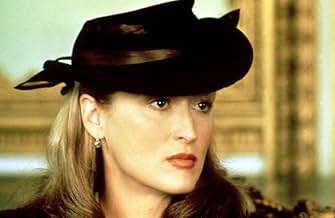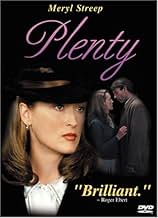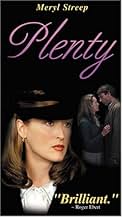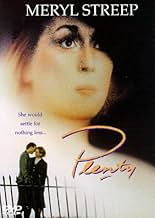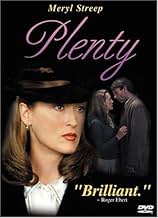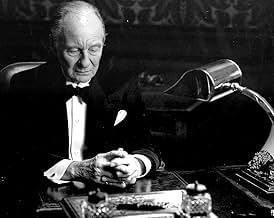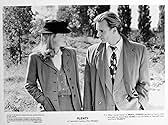IMDb रेटिंग
6.0/10
3.5 हज़ार
आपकी रेटिंग
अपनी भाषा में प्लॉट जोड़ेंA young Englishwoman spends twenty years to make whatever kind of life for herself, at the expense of others around her, in post-World War II England.A young Englishwoman spends twenty years to make whatever kind of life for herself, at the expense of others around her, in post-World War II England.A young Englishwoman spends twenty years to make whatever kind of life for herself, at the expense of others around her, in post-World War II England.
- 2 BAFTA अवार्ड के लिए नामांकित
- 2 जीत और कुल 5 नामांकन
André Maranne
- Villon
- (as Andre Maranne)
फ़ीचर्ड समीक्षाएं
PLENTY cast such a spell on me. It is one of those films which has a mood and tone all of its own. It is sombre, dreamy and elegaic. And it features a little seen, yet compelling and masterful central performance from Meryl Streep, who lights up the screen with the type of intelligence and female strength one laments the absence of in contemporary film.
Based on David Hare's play, PLENTY (like so much of his work) boasts wonderfully complex, multi-layered roles for women. Meryl Streep and Tracey Ullmann excel with the intelligent dialogue given to them by this incredible writer - and despite the plethora of strong male actors surrounding them, it is the women whose stories move and interest us the most.
What I love about PLENTY is that so much about it is anti-Hollywood. Its convoluted plot is often incoherent and dreamlike, its dependence upon memories and the co-existence of past and present present challenges for audiences who normally would be sign posted in the 'correct' direction. It has an impressionistic, hypnotic feel, and the film's characters, especially Susan, are unappologetic and potentially dislikeable people. Its narrative resoultion is ambiguous, refusing the closure of more traditional dramas. Here we have a film which refuses to pander to the demands of the mainstream, and for that it is to be applauded.
Is there anything new that any of us can say about Meryl Streep??? This is a must for admirers of the actress, and a must for anyone with a penchant for riveting, deeply intelligent acting. Meryl grabs the part by the throat, investing Susan with a compelling defiance, a fierce intelligence, a sensuality, and a restrained beauty. Watch out for the dinner party scene. I forgot there was anyone else in the room (a room which included Sir John Gielgud and Charles Dance!) Such command, such depth, and such naturalness. This is an actress of phenomenal depth and magnificent expression. And such wonderful chemistry with the other actors! (Even Charles Dance who reportedly was a bit of a diva on set!! I wonder if this helped to enhance the fiery antagonsim between them on screen?)
In sum, PLENTY is deeply complicated, but give it time, watch it more than once and you will be rewarded. For its thoughtful direction, its searing, intricate dialogue and its mesmerising acting - this is a film that deserves to be seen by much larger audiences. Bravo Queen Meryl!!
Based on David Hare's play, PLENTY (like so much of his work) boasts wonderfully complex, multi-layered roles for women. Meryl Streep and Tracey Ullmann excel with the intelligent dialogue given to them by this incredible writer - and despite the plethora of strong male actors surrounding them, it is the women whose stories move and interest us the most.
What I love about PLENTY is that so much about it is anti-Hollywood. Its convoluted plot is often incoherent and dreamlike, its dependence upon memories and the co-existence of past and present present challenges for audiences who normally would be sign posted in the 'correct' direction. It has an impressionistic, hypnotic feel, and the film's characters, especially Susan, are unappologetic and potentially dislikeable people. Its narrative resoultion is ambiguous, refusing the closure of more traditional dramas. Here we have a film which refuses to pander to the demands of the mainstream, and for that it is to be applauded.
Is there anything new that any of us can say about Meryl Streep??? This is a must for admirers of the actress, and a must for anyone with a penchant for riveting, deeply intelligent acting. Meryl grabs the part by the throat, investing Susan with a compelling defiance, a fierce intelligence, a sensuality, and a restrained beauty. Watch out for the dinner party scene. I forgot there was anyone else in the room (a room which included Sir John Gielgud and Charles Dance!) Such command, such depth, and such naturalness. This is an actress of phenomenal depth and magnificent expression. And such wonderful chemistry with the other actors! (Even Charles Dance who reportedly was a bit of a diva on set!! I wonder if this helped to enhance the fiery antagonsim between them on screen?)
In sum, PLENTY is deeply complicated, but give it time, watch it more than once and you will be rewarded. For its thoughtful direction, its searing, intricate dialogue and its mesmerising acting - this is a film that deserves to be seen by much larger audiences. Bravo Queen Meryl!!
This is one film which has grown on me since I saw it on main circuit. It is an intelligent film, which demands a lot of active viewing. Aided with an incisive script by David Hare, it looks at Britain's history from the end of WWII, through to Queen Elizabeth's coronation the Suez Crisis, all counterpointed by the lead character, Susan Treherne (played, in I think one of her best moments, by Meryl Streep.) The film plays on the word "Plenty" and the hope for UK after WWII that there would be plenty - in itself ironic. It is also a study of a woman afflicted by bipolar disorder (manic-depression). This is not the focus of the film; in fact, it is never explicitly stated.... At the time portrayed, psychiatric illness wasn't acknowledged - it tended to be swept under the carpet.
Streep imbues Susan with a dignity, despite her liking to "lose control"; there are excellent performances by Sam Neill (Lazar, her war-time "love"), Tracey Ullman, Sting, Charles Dance (her long-suffering husband) and John Gielgud (as the diplomat who takes the fall for the Suez Crisis.) It's not an easy film, but worth watching and discussing. It must be one of the most underrated films on IMDb.
Do yourself a favour, ACTIVELY engage with this. Don't let this film be overshadowed by Meryl Streep's other films of this time, like the overrated Out of Africa. They don't hold a torch to this film!
Streep imbues Susan with a dignity, despite her liking to "lose control"; there are excellent performances by Sam Neill (Lazar, her war-time "love"), Tracey Ullman, Sting, Charles Dance (her long-suffering husband) and John Gielgud (as the diplomat who takes the fall for the Suez Crisis.) It's not an easy film, but worth watching and discussing. It must be one of the most underrated films on IMDb.
Do yourself a favour, ACTIVELY engage with this. Don't let this film be overshadowed by Meryl Streep's other films of this time, like the overrated Out of Africa. They don't hold a torch to this film!
This much-overlooked British drama opens with, literally fades in on, her days in WWII France. It follows her through the next 15 or 20 years, and ends with an aching scene from a past day when she thought tomorrow seizes nothing but good things for her. But nothing else in her life is ever as valuable, as dignifying or as exciting as the war. She is, maybe, a little insane. She divulges in one scene that she has a considerable issue: "Sometimes I like to lose control."
Fred Schepisi's obscure film stars Meryl Streep and it is a performance of daring delicacy. It is hard to play an irrational, maladjusted, quasi-suicidal woman with such tenderness or grace. She is oftentimes quite charming to be around for the other characters, and when she is letting herself fall short of restraint, she doesn't do it in the vein of those exclusive movie frenzy scenes but with a relatively pleasant imperativeness.
When she returns to England after the war, she makes friends with a round-faced, grinning imp played by a refreshing Tracey Ullmann. Another is Charles Dance's foreign service officer who is initially charmed by her casual, free-spirited lifestyle, and then marries her and becomes her permanent aggrandizer, putting up a barricade of composure and practically divine patience around her tantrums.
It is challenging to pigeonhole specifically what it is that disturbs Streep's character. Early on, David Hare's screenplay shepherds us to her own heuristic that after the valor and brazenness of the war, after the gallantry and the passion, it is beyond absurd to her to readjust back to normal life and endure the tedious small talk of civil commonality. Yet as the film proceeds in a clandestine manner of being episodic, we find there is something persistent, a little vicious, in the way she humiliates her husband at crucial times, constantly seeking to be tactless and incongruous. Ultimately, we gravitate toward his position when he eventually thunders that she is hateful and pitiless, and oblivious to those who have withstood her.
But then there is an postlude, moistened by the misty twilight of the most dismal hour of fall, and there is such despondence in the way she and another character both become conscious that nothing will ever graze them again the way the war did. This bit part-filled movie is conclusively not a assertion concerning war, or foreign service, or middle-class British, but just the story of this lost woman who at one time lived profoundly, and now finds that she is barely even living.
The performances grant one enthralling solitaire after another. Most of the pivotal instances come as different characters eclipse different scenes. Streep births a complete character around a woman who could have merely been a hit list of problems. Charles Dance has an unrewarding part, as her perpetually agonized husband who from the beginning seems like a very dull bureaucrat, but survives to show that he is respectable as well as foolish. Sting plays a commonplace young man who ineffectively tries to conceive Streep's child for her. John Gielgud has three small scenes and steals them all, which essentially is the story of his career. Plenty is written, acted and directed as a lather of refinement and delicate shrewdness, underneath which grows the revelation that life can often be futile, dull and depressing, and that there can be days, months, years, decades in accordance.
Fred Schepisi's obscure film stars Meryl Streep and it is a performance of daring delicacy. It is hard to play an irrational, maladjusted, quasi-suicidal woman with such tenderness or grace. She is oftentimes quite charming to be around for the other characters, and when she is letting herself fall short of restraint, she doesn't do it in the vein of those exclusive movie frenzy scenes but with a relatively pleasant imperativeness.
When she returns to England after the war, she makes friends with a round-faced, grinning imp played by a refreshing Tracey Ullmann. Another is Charles Dance's foreign service officer who is initially charmed by her casual, free-spirited lifestyle, and then marries her and becomes her permanent aggrandizer, putting up a barricade of composure and practically divine patience around her tantrums.
It is challenging to pigeonhole specifically what it is that disturbs Streep's character. Early on, David Hare's screenplay shepherds us to her own heuristic that after the valor and brazenness of the war, after the gallantry and the passion, it is beyond absurd to her to readjust back to normal life and endure the tedious small talk of civil commonality. Yet as the film proceeds in a clandestine manner of being episodic, we find there is something persistent, a little vicious, in the way she humiliates her husband at crucial times, constantly seeking to be tactless and incongruous. Ultimately, we gravitate toward his position when he eventually thunders that she is hateful and pitiless, and oblivious to those who have withstood her.
But then there is an postlude, moistened by the misty twilight of the most dismal hour of fall, and there is such despondence in the way she and another character both become conscious that nothing will ever graze them again the way the war did. This bit part-filled movie is conclusively not a assertion concerning war, or foreign service, or middle-class British, but just the story of this lost woman who at one time lived profoundly, and now finds that she is barely even living.
The performances grant one enthralling solitaire after another. Most of the pivotal instances come as different characters eclipse different scenes. Streep births a complete character around a woman who could have merely been a hit list of problems. Charles Dance has an unrewarding part, as her perpetually agonized husband who from the beginning seems like a very dull bureaucrat, but survives to show that he is respectable as well as foolish. Sting plays a commonplace young man who ineffectively tries to conceive Streep's child for her. John Gielgud has three small scenes and steals them all, which essentially is the story of his career. Plenty is written, acted and directed as a lather of refinement and delicate shrewdness, underneath which grows the revelation that life can often be futile, dull and depressing, and that there can be days, months, years, decades in accordance.
David Hare's brilliant stage play has been translated beautifully to the screen. The peculiar English trait of natural melancholy radiates throughout this sad exercise of seeing all through the lens of British class consciousness, repression and despair. The color photography, the performances, the stifling framing of the widescreen shots all add to the oppressive beauty of a story about the self-destruction of a preternaturally beautiful woman. Mery Streep has never been better before or since. Hare makes her intellectual acuity a weapon against herself as she sees through all the ghastly pretenses of a corroding Empire. No insight, no beauty of body, no letting go of formality and pretense can save her from herself. Feminism itself is taken to the burning stake as Streep's character thrashes, Hedda Gabbler like, against walls and prohibitions beyond her understanding. Rarely has such condemnation looked so ravishing.
This is a film where you can get lost, wonderfully lost. Following Susan, the character created on the page by David Hare and on the screen by Meryl Streep, is a journey of gloriously unexpected ups and downs. It may be because the amazing Meryl Streep goes trough the analytic intellect of David Hare with her heart on her sleeve and I felt shattered and moved by the access she provided me into the heart and soul of her own personal labyrinth. To look back with regret and feel that memories of fleeting moments of extraordinary beauty can keep you going and see you through whatever hell fate seems determined to throw your way. Meryl Streep never looked this beautiful and the transparency of her missteps are a magic sweep of the most enthralling kind. Irrationaly sane. Like most of the great bipolar. They know, they've seen through. There is nothing ahead only behind and now it's too bloody late. The stages of Susan's journey, to the after war lands of plenty are framed by her own geniality - the character's and the actress's - Susan is overwhelmed by her own awareness, lonelier and lonelier, Meryl overwhelm us with her own sublime generosity. Fred Schepsi, the extraordinary man at the helm, keeps the puzzle open and clear. Like most works of art, not everyone will be ready to open up to this experience. Pretty frustrating let me tell you. I would love to share this experience with everyone.
क्या आपको पता है
- ट्रिवियाThe original Broadway production of "Plenty" by David Hare opened at the Plymouth Theater in New York City on January 6, 1983, and ran for ninety-two performances until it closed on March 27, 1983. The play was nominated for four Tony Awards in 1983, including Best Play. Also, the play won the New York Drama Critics' Circle Award for Best Foreign Play of the 1982 to 1983 season.
- गूफ़Queen Elizabeth II's coronation was in 1953, yet the flag display in the background includes the Canadian "maple leaf" flag which was not adopted until 1965.
- भाव
Susan Traherne: I would stop, I would stop, I would stop fucking talking if I ever heard anybody else say anything worth fucking stopping talking for!
- कनेक्शनFeatured in At the Movies: Crossover Dreams/Maxie/Mishima/Plenty (1985)
टॉप पसंद
रेटिंग देने के लिए साइन-इन करें और वैयक्तिकृत सुझावों के लिए वॉचलिस्ट करें
- How long is Plenty?Alexa द्वारा संचालित
विवरण
- रिलीज़ की तारीख़
- कंट्री ऑफ़ ओरिजिन
- भाषा
- इस रूप में भी जाना जाता है
- Eine demanzipierte Frau
- फ़िल्माने की जगहें
- उत्पादन कंपनियां
- IMDbPro पर और कंपनी क्रेडिट देखें
बॉक्स ऑफ़िस
- बजट
- $1,00,00,000(अनुमानित)
- US और कनाडा में सकल
- $61,48,000
- US और कनाडा में पहले सप्ताह में कुल कमाई
- $4,36,266
- 22 सित॰ 1985
- दुनिया भर में सकल
- $61,48,000
- चलने की अवधि
- 2 घं 4 मि(124 min)
- रंग
- ध्वनि मिश्रण
- पक्ष अनुपात
- 2.35 : 1
इस पेज में योगदान दें
किसी बदलाव का सुझाव दें या अनुपलब्ध कॉन्टेंट जोड़ें


